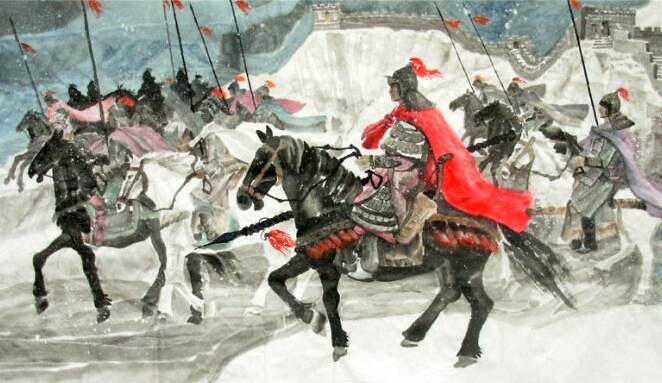Over the Border
- Poetry of Wang Changling

The moon goes back to the time of Qin, the wall to the time of Han,
And the road our troops are travelling goes back three hundred miles....
Oh, for the Winged General at the Dragon City --
That never a Tartar horseman might cross the Yin Mountains!
Folk-song-styled-verse
The underlying tone of this poem is one that is both regretful and patriotic. In the very first line of the poem, Wang Changling references two aspects of nature that have not changed — the moon, which was still the same even from the Qin Dynasty, and the mountain passes, which had not altered since the Han Dynasty. The Qin Dynasty was the first dynasty of China, known for its building of the Great Wall, and the Han Dynasty was the second dynasty, often considered the Golden Age of Ancient China due to the strengthening of the Chinese army that allowed for a long period of peace and prosperity. Although these aspects of nature have not altered, something about the state of China has changed. What changed about China? In the second line, readers begin to feel the underlying tone of regret when Wang states that men seldom return from their expeditions. It can be inferred that the expeditions refer to some form of military expeditions or war that is ongoing in China at this time. Evidently, the change Wang refers to is the weakening of China and its downfall from the Golden Age. Why did China experience a downfall? The reason why, Wang states, is because the Flying General is no longer here. The Flying General references Li Guang, a Chinese general in the Han dynasty, whose intimidating presence often drove his enemies away. As such, it becomes clear that Wang laments over the death of General Li and the current weak state of the Chinese army. The patriotic tone shines through this entire poem; this poem reveres a man who made China invincible and laments over his ultimate death, which also seemed to bring the downfall of the Chinese army.
秦时明月汉时关,万里长征人未还。
但使龙城飞将在,不教胡马度阴山。
- Why Chinese poems is so special?
- The most distinctive features of Chinese poetry are: concision- many poems are only four lines, and few are much longer than eight; ambiguity- number, tense and parts of speech are often undetermined, creating particularly rich interpretative possibilities; and structure- most poems follow quite strict formal patterns which have beauty in themselves as well as highlighting meaningful contrasts.
- How to read a Chinese poem?
- Like an English poem, but more so. Everything is there for a reason, so try to find that reason. Think about all the possible connotations, and be aware of the different possibilities of number and tense. Look for contrasts: within lines, between the lines of each couplet and between successive couplets. Above all, don't worry about what the poet meant- find your meaning.
- Seven Poems on Kaiyuan Era: Dancing Horses
- Midnight Song of the Four Seasons: Summer
- In Reply to Pimei’s Poem Written During Illness
- Ten Odes on Tea Utensils: Tea Vale White Lotus
- Spring Thoughts II
- The Arcane Celadon of Yue Kiln
- Lodging by Riverside Tower
- Along the River for Flowers Alone I
- The Cottage by the Stream
- The Lotus-Gathering Song